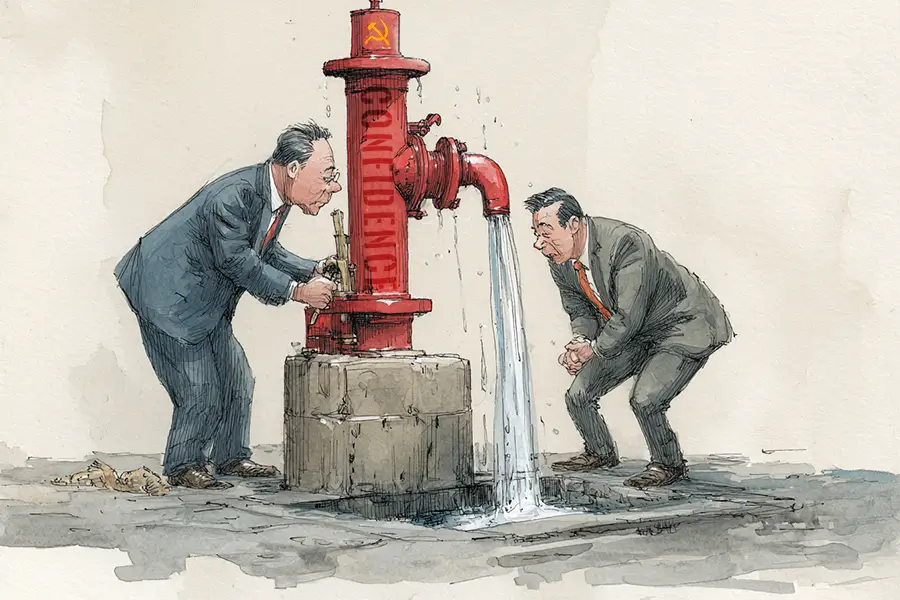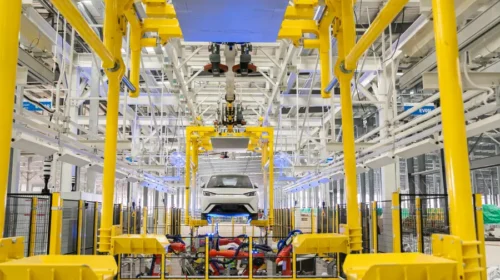“I’ve never seen such vicious competition in my lifetime as the case with Chinese companies.”

By Doug Young & Rene Vanguestaine
On the surface, a stock market boom in China has little in common with a food delivery turf war in São Paulo. Yet, the state-driven frenzy lifting Chinese stocks and the bare-knuckle brawl between Meituan (3690.HK) and DiDi both spring from the same source: a unique domestic ecosystem whose characteristics the world is only now beginning to fully comprehend.
The numbers behind China’s stock rally are indeed remarkable. Over the last 52 weeks, the benchmark Hang Seng Index has soared by 40%, with the Shanghai Composite following closely at 36%. By comparison, the S&P 500 and Dow Jones have seen more modest gains of 16% and 10%, respectively. While some argue this rally is a justified correction for stocks that were beaten down for years, we believe there is a distinct lack of fundamentals to support such a surge, given China’s sluggish overall economy.
In our view, two primary forces are at play. First, Chinese investors have few other places to put their money. The real estate sector is in a prolonged slump and interest rates have been driven to low levels, leaving the stock market as one of the only viable options for achieving a decent return.
Second, and more importantly, is speculation driven by government policy. Beijing has made it clear it will prop up specific sectors deemed national security priorities. We have seen a flood of investment into industries like new energy, EVs, artificial intelligence, and semiconductors, fueled by a belief that government-favored companies are a sure bet. This rally is built on the hope that if you invest where the government points, you will make money.
This brings us to the critical question of sustainability. We’ve seen this movie before. A decade ago, in 2015, Chinese markets doubled in about six months before crashing just as spectacularly. However, we should be cautious about direct historical comparisons. That rally occurred when China’s economy was far stronger. More recent, smaller rallies have faltered when government promises of support failed to turn into concrete action. This time feels different only because the government’s efforts to support key sectors seem more genuine. Yet, the rally’s survival still hinges on Beijing delivering tangible results for the broader economy, not just more words. If concrete actions to boost the consumer economy don’t appear in the coming months, we believe investors may start pulling out.
A Chinese tech feud in Brazil
The second event, an emerging corporate feud in South America, shows what happens when China’s domestic business culture goes global. The clash involves ride-hailing giant DiDi and food delivery leader Meituan, which are now battling for supremacy in Brazil. DiDi, already established in the market with its 99 Food brand, responded to Meituan’s planned entry with its Keeta brand by allegedly pressuring its restaurant partners not to work with the newcomer. Meituan sued for unfair competition in São Paulo, and DiDi promptly countersued for trademark infringement, claiming Keeta’s yellow branding was too similar to its own.
This drama is quite amusing. Meituan certainly has a point about DiDi’s anti-competitive behavior. Yet, we can’t help but note the irony, as Meituan is hardly a fair player itself. It used aggressive undercutting tactics to drive competitors like Deliveroo out of Hong Kong. This is a case of the pot calling the kettle black.
On a more serious note, this public spectacle has significant implications. The outcome will be decided not by the companies, but by Brazilian courts and the government. They face a difficult choice: allow the price wars to bring cheaper services to consumers, or protect local businesses from being wiped out by these foreign giants. Brazil has a history of protecting its industries, as seen with recent tariffs on Chinese steel, and it may feel compelled to act.
This kind of “vicious competition,” as President Xi Jinping once reportedly called it, is something we see constantly among Chinese companies. Whether it’s the EV and solar panel sectors at home or the clash between Shein and Temu abroad, the race to the bottom is a defining feature. This behavior stands in stark contrast to the more “civilized” and rational competition seen among Western firms, which typically focuses on product value and advertising rather than aggressive price cutting and public lawsuits.
As Chinese companies expand, emerging markets may become more aggressive in setting boundaries to give their own players a chance to innovate and grow. The state-driven system that fuels speculative stock rallies at home has also bred a generation of companies whose primary instinct is cutthroat rivalry, and the world is now their arena.
About China Inc
China Inc by Bamboo Works discusses the latest developments on Chinese companies listed in Hong Kong and the United States to drive informed decision-making for investors and others interested in this dynamic group of companies.
Subscribe to China Inc on your favorite app:









